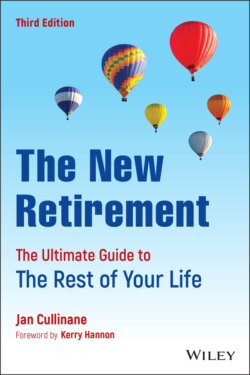Читать книгу The New Retirement - Jan Cullinane - Страница 9
CHAPTER 1 What Makes Retirement Successful?
ОглавлениеDid you take the SAT or ACT? If so, did you try a few practice tests or take a prep course to familiarize yourself with these assessments prior to the actual test? If you had children, did you help prepare them for kindergarten by teaching them numbers and shapes and colors and letters? If you had a job interview, did you research the company, prepare questions to ask the interviewer(s), dress appropriately, and show up on time? For most of us, the answers would be yes. Preparation is an important ingredient for achieving our goals.
Yet, you have probably heard that many people spend more time planning a two-week vacation than they do planning for retirement. It's understandable – you're caught up in day-to-day living, you have a lot on your plate, you have competing demands for your time, and retirement may seem far away. Thinking about retirement can cause “analysis paralysis.” So many choices – whether to stay or relocate, how to structure your time, aging parents and/or boomerang kids, whether to continue working in some fashion, and so forth. And, of course, if you're part of a couple, aligning retirement goals may be a challenge (such as the couple at a talk I was giving told me they had never discussed it, but the wife assumed they were moving to the East Coast when they retired and husband assumed they would relocate to the West Coast!).
To demonstrate how significant retirement is, consider the Holmes and Rahe Stress Scale. Two psychiatrists, Thomas Holmes and Richard Rahe, developed a list of 43 common life events of varying severity, and ranked them based on more than 7,500 participants' responses. For example, the top stressful event on the scale is the loss of a spouse or child. The forty-third event on the list is a minor violation of the law (such as a parking ticket). Retirement ranked number 10, right above “a major change in the health or behavior of a family member.” Pretty telling.
When you consider how much time you may have after leaving a primary career, recognize that women in the United States have an average lifespan of 81 years and retire on average at age 63 (according to the Census Bureau), so retirement averages about 18 years for women, and a little less for men, with their few years' shorter lifespans. So, let's see: 18 (years) × 365 (days/year) = 6,570 days of retirement; some people will spend 20 or 30 or more years in retirement. It's obvious that it's vital for peace of mind to spend time planning, both from a financial and nonfinancial standpoint.
Think of this book as a prep class for retirement. A prep class that will help you become confident as you approach this transition, and formulate what specific actions to take (with your significant other, if there is one) to make these years the best years. And, this class is “taught” by an award-winning expert (with contributions from other experts) with more than 40 years of experience in both the financial and nonfinancial areas of retirement.
